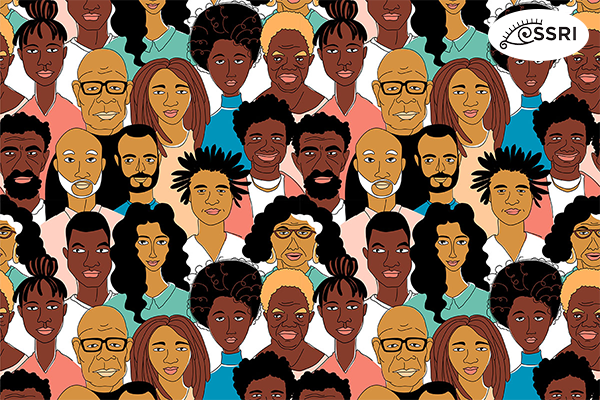Introduction
The coronavirus pandemic has triggered a dual crisis in American society: a public health emergency and an economic downturn. These crises are interlinked, with the strain on the healthcare system impacting economic activity and consumer spending. The pandemic has affected various aspects of daily life, from personal routines to business operations.
The impact on Black Americans highlights pre-existing disparities in economic and health conditions. Historically, this group has faced lower wealth levels, higher unemployment rates, and significant food and housing insecurity. COVID-19 has worsened these vulnerabilities, leaving many with limited resources to handle the economic shocks (Bambra et al., 2020).
Economic challenges for Black Americans during the pandemic are tied to long-standing inequalities in health and socioeconomic status. Lower wealth and income levels, combined with weaker labor market outcomes, have intensified the risks of poor health and diminished quality of life. This situation underscores the troubling link between race and pandemic impact, with economic status being a significant factor.
Addressing the needs of underserved populations has long been a challenge for social workers. To support these populations effectively, social services must offer consistent and relevant programs, including healthcare, unemployment benefits, housing assistance, food stamps, and vaccination education. Social agencies need adequate resources to educate communities on navigating the health crisis and connecting them with necessary assistance programs. Organizations like the NAACP provide comprehensive services to African American communities nationwide.
Addressing the Problem at the Micro Level
At the micro level, social work focuses on providing direct, personalized assistance to individuals, households, and small groups, helping them navigate complex social challenges. This approach is essential for addressing immediate issues faced by Black Americans during the COVID-19 pandemic, such as housing instability, food insecurity, unemployment, and limited access to healthcare.
Housing insecurity is a significant concern amid the economic downturn, with African American renters experiencing higher rates of housing distress—30% compared to 15% among their white counterparts (Hardy & Logan, 2020). Social workers should directly engage with affected households, offering targeted support. For example, Atlanta Housing (AH) can assist low-income families, the elderly, and individuals with special needs by providing rent assistance and advocating for policies to prevent eviction. Social workers must tailor their interventions to individual needs, helping some clients apply for government assistance while offering emergency housing solutions to others in crisis.
In healthcare settings, social workers play a crucial role in helping individuals and families secure health insurance benefits and manage the trauma and adjustments required by the pandemic. Educating clients about the importance of COVID-19 vaccination is particularly critical, as Black Americans face a death rate from the virus nearly six times higher than their white peers (Wen & Sadeghi, 2020). This education is vital due to the higher risk associated with living in densely populated areas and working in high-risk environments. Additionally, social workers should be aware that Black Americans also suffer from higher rates of chronic illnesses, such as obesity, diabetes, and kidney disease, which increase the risk of severe outcomes from COVID-19 (Yancy, 2020). Addressing these disparities requires a comprehensive approach to support and education within the community.
Addressing the Problem at the Mezzo Level
At the mezzo level of social work practice, professionals focus on assisting vulnerable populations within larger groups, organizations, and communities. This approach targets systemic issues affecting these populations by addressing broader organizational and community factors.
To effectively support Black Americans during the COVID-19 pandemic, social workers should evaluate and tackle systemic factors impacting these communities. Key issues like food insecurity and unemployment must be addressed as significant contributors to their challenges.
For example, the Atlanta Community Food Bank is vital in combating hunger within the African American community. Partnering with over 700 non-profits, including community kitchens and senior centers (Atlanta Community Food Bank, 2021), the organization provides essential support. Social workers can collaborate with this group to assess client eligibility for food assistance and ensure that low-income families, particularly those with children, receive the necessary support.
The pandemic has worsened unemployment disparities due to occupational segregation, with many Black workers confined to lower-wage, less secure jobs with minimal benefits (Maxwell & Solomon, 2020). Addressing job assistance at the mezzo level is crucial to tackling these economic disparities. The significant income drop has especially impacted households where primary earners cannot work remotely or adhere to social distancing measures (Maxwell & Solomon, 2020). Many Black Americans are left unemployed with fewer job opportunities.
Social workers should work with groups to provide resources and education that enhance job search and employment prospects. Support in navigating the job market, identifying strengths and weaknesses, and creating effective resumes is crucial for securing and maintaining employment, leading to financial stability. Connecting clients with agencies like WorkSource can facilitate workforce entry and broaden access to job opportunities.
In addition, social workers can engage in advocacy to design programs that address COVID-19-related disparities and promote social justice. For example, the NAACP advocates for economic equity, highlighting policy inadequacies and educating communities about racial inequality (NAACP, 2020). The organization supports investments in community-driven strategies for inclusion, equity, and diversity. Social workers should assist clients in participating in social justice initiatives and work to expand opportunities for African American workers, business owners, and consumers, creating more pathways for entrepreneurship.
Addressing the Issue at the Macro Level
At the macro level of social work practice, professionals take a broad approach to tackling At the macro level, social workers address systemic roots of social injustices on a broader scale through political advocacy, research, and large-scale programs. The intersection of the economic and public health crises has worsened financial instability in Black communities, increasing disease exposure, especially among those in essential roles (Maxwell & Solomon, 2020).
African Americans are overrepresented in the healthcare sector, which has been heavily strained during the pandemic, and are disproportionately employed in essential industries affected by outbreaks (Hardy & Logan, 2020). Additionally, they often live in densely populated areas, increasing their COVID-19 exposure. These factors have collectively placed many Black communities in difficult circumstances, leading to adverse health and economic outcomes.
At the macro level, social workers should advocate for and support comprehensive economic relief measures to improve financial stability and security across the population. For Black households severely impacted by the pandemic, policies such as those in the Heroes Act should be strongly supported (NASW, 2020). The Heroes Act proposes emergency funding, assistance for state and local governments, an expanded Paycheck Protection Program, and removal of cost-sharing for COVID-19 treatments (“H.R.6800 – The Heroes Act,” 2020). Given the financial vulnerability of Black Americans during this crisis, any uncertainty about relief and social safety-net benefits disproportionately affects them. Social workers must ensure these communities are informed about available aid and equipped to use these resources to mitigate the pandemic’s impact.
Organizations like the NAACP must represent Black communities’ interests, ensuring they receive necessary benefits and support. Disparities in unemployment insurance, cash assistance, job security, and minimum wages were evident before the pandemic and have worsened since. Therefore, macro-level social workers should advocate for economic measures that strengthen the overall economy, support public-sector jobs crucial for many Black Americans, and enhance state safety-net programs and government-funded non-profits providing housing and food assistance.
Addressing economic inequality within Black communities is a matter of racial justice. Social workers should use their cultural awareness and diversity to drive reforms at local, state, and national levels. Effective advocacy involves creating and supporting programs that address ongoing discrimination, marginalization, and limited access to reliable healthcare.
Applying Social Work Values and Ethical Standards
Addressing the challenges faced by African American communities during the coronavirus pandemic requires social workers to adhere to core values and ethical standards, including service, social justice, and respect for dignity and worth.
Service involves empowering individuals, families, and communities to seek necessary help without hesitation (Ferguson et al., 2021). Social workers provide support by organizing mutual aid efforts, community meals, and temporary housing during the pandemic.
Social justice requires social workers to advocate for disadvantaged groups, amplify their voices, and push for policy changes. They must address socioeconomic injustices faced by Black communities, offering essential information and resources to promote equality. Reflecting on personal biases and privileges is crucial for creating a fair support system that reduces disparities.
Respect for dignity involves recognizing individual differences and cultural diversity, treating each person with respect to support their well-being during the pandemic (Banks et al., 2020). A client-centered approach honors values and self-determination.
Ethical dilemmas may arise, such as when a social worker faces a situation involving a single mother with addiction issues. The dilemma involves deciding whether to report the mother to Child Protective Services, risking the children being removed, or referring her to mental health and addiction specialists while the children remain at risk. The pandemic exacerbates these decisions due to additional financial and health challenges. Resolving such dilemmas involves collaborating with mental health and addiction professionals, maintaining transparent communication with the client, and exploring ways to support both the mother and her children effectively.
Conclusion
The COVID-19 pandemic has significantly worsened the economic landscape in the U.S., revealing and amplifying racial inequalities and posing severe challenges for Black households. Social workers must address these issues at the micro, mezzo, and macro levels.
At the individual level, it is crucial to provide targeted support to improve the quality of life for clients facing urgent challenges. This includes offering assistance with housing, employment, and food security to those with low incomes. However, addressing these issues on a larger scale requires pushing for systematic and comprehensive changes in governmental policies and societal structures. An inclusive economic framework is essential to prevent socioeconomic disadvantages from further undermining the health and well-being of Black communities.
While individual case management can address immediate concerns, it is a short-term solution, and resources may quickly become depleted. Many social service agencies have temporarily halted accepting new applications due to insufficient resources. As a Master Social Worker, advocating for economic equality and comprehensive policy reform is crucial to ensure that Black Americans are not left struggling during emergencies.
Advocacy at both the mezzo and macro levels is necessary to address systemic issues rather than merely dealing with individual cases. Establishing robust policies for economic parity and emergency financial support is essential to mitigate the negative impacts of external crises. Given the persistent financial and public health challenges, significant and systemic support will be required, especially for Black communities. Although achieving equality will be a lengthy process due to entrenched inequities, the persistence and advocacy of social workers can pave the way for social, economic, educational, and political equity.
References
Atlanta Community Food Bank. (2021). Who we are and what we do.
Bambra, C., Riordan, R., Ford, J., & Matthews, F. (2020). The COVID-19 pandemic and health inequalities. Journal of Epidemiology and Community Health, 74(11), 964–968.
Banks, S., Cai, T., de Jonge, E., Shears, J., Shum, M., Sobocan, A.,… Weinberg, M. (2020). Practicing ethically during COVID-19: Social work challenges and responses. International Social Work, 63(5), 569-583.
Ferguson, H., Disney, T., Warwick, L., Leigh, J., Singh Cooner, T., & Beddoe, L. (2021). Hostile relationships in social work practice: Anxiety, hate and conflict in long-term work with involuntary service users. Journal of Social Work Practice, 35(1), 19-37.
H.R.6800 – The Heroes Act. (2020).
Hardy, B., & Logan, T. (2020). Racial economic inequality amid the COVID-19 crisis.
Maxwell, C., & Solomon, D. (2020). The economic fallout of the coronavirus for people of color.
NAACP. (2021). Inclusive economy.
NASW. (2020). House passes HEROES Act.
Wen, L. S., & Sadeghi, N. B. (2020). Addressing racial health disparities in the COVID-19 pandemic: Immediate and long-term policy solutions.
Yancy, C. W. (2020). COVID-19 and African Americans. JAMA, 323(19), 1891-1892.




